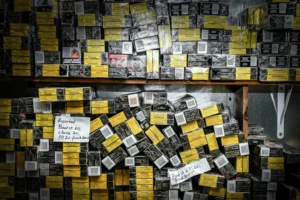
When Jair Bolsonaro walked into Facebook’s office in Brasília, the capital of Brazil, housed in the imposing building Corporate Financial Center, on the late afternoon of April 2, 2025, the tension was palpable. For Meta’s leadership in Brazil, it was crucial that the meeting did not make to the news. After all, former president Bolsonaro was a defendant for attempting a coup d’état with the help of the military (a verdict is expected this week), and a friendly meeting would send the wrong message.
But the mood was quickly broken by the impulsiveness of a maintenance worker, who cut through the crowd to hug the former president. She bypassed two federal police officers, the president of Bolsonaro’s Liberal Party, Valdemar Costa Neto, and the rest of Bolsonaro’s entourage. She even bypassed Meta’s own beefed-up security that day — after all, there are protocols for receiving current and former heads of state.
Bolsonaro took advantage of the more relaxed atmosphere to present Murillo Laranjeira, Meta’s senior public policy director in Brazil, with a silver medal engraved with his face — the same medal he had given to allies such as Argentina’s President Javier Milei.
Related Article Block Placeholder
Article ID: 1220475
The group locked themselves in the meeting room. Sitting alongside Laranjeira were other lobbyists: Kaliana Kalache, Marconi Machado, Mário César Vilhena, Lilian Estevanato, Yana Dumaresq, and André Atadeu.
Laranjeira led the conversation, introducing the team and thanking Bolsonaro for the party’s participation in the PL’s 1st Communications Summit, conceived by Michelle Rodrigues. Laranjeira also acknowledged that, in terms of communications, the party was the most well-structured.
Independent. Irreverent. In your inbox
Get the headlines they don’t want you to read. Sign up to Crikey’s free newsletters for fearless reporting, sharp analysis, and a touch of chaos
By continuing, you agree to our Terms & Conditions and Privacy Policy.
Beyond his “uncle at a family gathering” mannerisms, Bolsonaro’s breathless speech touched Facebook’s leadership, as did the tears in his eyes when he spoke about his possible imprisonment. “If I get arrested, I won’t last two days,” he said.
After this emotional moment, Meta’s executives went on the offensive. They discussed the bills that bothered them, explaining why, in the company’s view, the regulations would harm their interests and also the functioning of the internet in Brazil. Among them was Bill 2630, known as the “Fake News Bill,” which proposes a regime of accountability and transparency for social media, as well as other bills concerning the protection of children online and artificial intelligence.
Even though the visit had to be kept away from the spotlight — everyone had to sign a non-disclosure agreement — it had been approved by Meta’s higher authorities. It was, therefore, an institutional decision. It crowned an alliance that would have been unthinkable just two years earlier. Until early 2023, tech companies were viewed with suspicion by most Bolsonaro-aligned lawmakers.
“Our first meetings with Big Tech were to demand reinstatement of our pages that were taken down,” says representative Sóstenes Cavalcante, PL leader in the House, in an interview for Agência Pública.
“The relationship improved after Bill 2630. It was the DNA of who wants to censor them, who wants and who doesn’t want to harm them commercially,” he explains. “Before that, we saw them as our enemies. We always had issues with big tech because we always thought big tech benefited the left.”
Congressmen who opposed Bill 2630/2020 address the audience on voting day, May 2, 2023 (Image: Bruno Spada/Câmara dos Deputados)
Bill 2630 was passed by the Senate in 2020. In the House of Representatives, the bill was modified by a working group between July and December 2021, but its most advanced version was ultimately removed from the agenda on the fateful day of May 2, 2023.
For big tech, it proposed unacceptable interventions, such as liability for third-party content, nationalisation of advertising contracts, joint responsibility of ad providers for misleading advertising, production of transparency reports, and payment for the use of journalistic content.
Cavalcante says that nowadays, “every time there is a bill that will hurt their interests, they come to us here.”
Rep. Sóstenes Cavalcante, head of Bolsonaro’s party (Image: Marina Ramos/Câmara dos Deputados)
There have been many meetings in his office with tech lobbyists since then. “I received them every time they asked. I meet with them frequently. I think I must have had at least 10 meetings with them.”
Two years before aligning with Donald Trump’s far-right government, big tech executives, especially Google and Meta, were already applying in Brazil the formula they would later use in the US to avoid regulation. They embraced far-right politicians with radical speeches, who had previously been penalised or suspended from their platforms for violating safety policies.
“The political sorting process of the last decade, which passed through Brazil with Bill 2630, helped produce that iconic photo of Trump’s inauguration,” says Orlando Silva, rapporteur of the bill. “There was a sorting of the conservative field’s political position, and there was an approach of this field by big tech, producing an alignment.”
Rep. Orlando Silva, rapporteur of Bill 2630, in a presser on May 2, 2023 (Image: Bruno Spada/Câmara dos Deputados)
In this process of rapprochement, big tech lobbyists deployed a full menu of lobbying strategies that would later be refined and adopted in other anti-regulatory battles in Brazil and other countries. They made hundreds of visits to representatives and senators, promoted and funded events, happy hours and breakfasts, hired heavyweights like former president Michel Temer and dozens of professionals with government experience — a stratagem known as the “revolving door” — and even supported actions that can be classified as “astroturfing”, the creation of movements that appear independent but are tied to companies.
This is an extract from an investigation carried out by Agência Pública as part of the special report “Big Tech’s Invisible Hand”, a transnational partnership led by Pública and CLIP — the Centro Latinoamericano de Periodismo de Investigación — which brings together 17 media outlets working across 13 countries. Read the full story here.
Big Tech’s Invisible Hand is a cross-border, collaborative journalistic investigation led by Brazilian news organization Agência Pública and the Centro Latinoamericano de Investigación Periodística (CLIP), together with Crikey (Australia), Cuestión Pública (Colombia), Daily Maverick (South Africa), El Diario AR (Argentina), El Surti (Paraguay), Factum (El Salvador), ICL (Brazil), Investigative Journalism Foundation – IJF (Canada), LaBot (Chile), LightHouse Reports (International), N+Focus (Mexico), Núcleo (Brazil), Primicias (Ecuador), Tech Policy Press (USA), and Tempo (Indonesia). Reporters Without Borders and the legal team El Veinte supported the project, and La Fábrica Memética designed the visual identity.
Disclosure: As part of the news media bargaining code, Private Media (parent company of Crikey) received funds from Meta and Google from the middle of 2021. Meta terminated its deals with all publishers in mid-2024. Private Media continues to receive funding from Google as part of the code.





